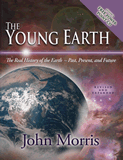Millions of Years
Millions of Years and the Gospel
What is at stake here is the authority of Scripture, the character of God, the doctrine of death, and the very foundation of the gospel. If the early chapters of Genesis are not true literal history, then faith in the rest of the Bible is undermined, including its teaching about salvation and morality.
Does the Age of the Earth Matter?
It is evident that secularists don’t really care if Christians reject evolution. But the minute people reject billions of years, they are labeled antiscience, anti-academic, and anti-intellectual. The pressure to believe in an old earth is extremely great.
History of Old-earth Teaching
Opponents of the old-earth theories rightly understood that the historical portions of the Bible are foundational to the theological and moral teachings of Scripture. Destroy the credibility of the former and sooner or later you will see rejection of the latter, both inside and outside the Church.
The RATE Research Project
The RATE project has carefully investigated the method of radioisotope dating: a method that allegedly shows rocks to be millions or billions of years old. The RATE researchers have uncovered powerful evidence that supports a recent creation, and explains the radioisotope data within the biblical timescale.
Articles About Millions of Years
-
Nov. 26, 2023 from Answers Magazine
Where’s the supposed evidence that the earth is 4.54 billion years old? It’s not on earth at all!
-
March 18, 2022 from Ken Ham Blog
Over the years, I’ve had many Christians use much of the argument that we need to trust the majority when it comes to evolution and millions of years.
-
Nov. 1, 2021 from The New Answers Book 2
Today, most people in the world, including most people in the Church, take for granted that the earth and universe are millions and millions of years old.
-
Sept. 29, 2021 from Answers in Depth
Can the evolutionist view of the history of natural evil be harmonized with the Bible’s apparent teaching that all of this evil is the consequence of the Fall?
-
Magazine ArticleEvolution or Millions of Years—Which Is the Greater Threat?Jan. 3, 2021 from Answers Magazine
When you talk to an evolutionist, which subject arouses the strongest reaction?
-
July 19, 2018 from Refuting Common Evolutionist Claims
Riding the rapids between walls of the Grand Canyon, a rafter supposedly peers up at millions of years. How do scientists arrive at such an old age?
-
Oct. 1, 2014 from Answers Magazine
Many Christians reject the straightforward, historical reading of the Genesis creation account simply because they believe it cannot be verified by science.
-
Jan. 1, 2014 from Answers Magazine
When creationists take a strong stand that God created the earth six thousand years ago, they’re often accused of making this a salvation issue. Well, it isn’t a salvation issue—but it is!
-
The “Disease” of Millions of YearsMay 21, 2012 from Answers Update
The idea of millions of years is like a disease, and biological evolution is like the symptom. Many Christians are willing to deal with the “symptom,” but not the “disease.”
-
Book ChapterWhy Shouldn’t Christians Accept Millions of Years?Aug. 16, 2007 from The New Answers Book 1
Is the age of the earth unimportant and divisive, as some Christians claim? Answers in Genesis thinks not.
-
Feedback ArticleDoes Answers in Genesis Accept “Billions of Years”?Sept. 29, 2006 from Feedback
With a better understanding of the concept of time, we will see that the article in question was in no way saying or implying the possibility of billions of years.
-
RATE Research Reveals Remarkable Results—A Fatal Blow to Billions of YearsNov. 7, 2005
This past weekend I had the privilege of attending the "Thousands ... Not Billions" conference where the results of the RATE (Radioisotopes and the age of the earth) project were presented.
-
Magazine ArticleWould Planes Sink into Ice?Sept. 1, 1997, pp. 29–30
Recalling the common school experiment in which a wire tensioned with weights ‘sinks’ through a block of ice, some wondered whether the planes could have sunk to that depth.
-
Magazine ArticleTop Geology Student: Millions of Years Needs ImaginationJune 1, 1994, pp. 44–45
Exceptional geology student Karen Odling is only the second woman since World War II to win the University Medal in Geology from Australia’s University of Sydney.
-
Semi-Technical Magazine ArticleAustralia’s Burning MountainMarch 1, 1993, pp. 42–46
For as long as anyone can remember Mt Wingen has been burning, with an acrid smell of sulphur in the fumes issuing from cracks along its summit.
Recommended Resources

Answers in Genesis is an apologetics ministry, dedicated to helping Christians defend their faith and proclaim the good news of Jesus Christ.
- Customer Service 800.778.3390
- Available Monday–Friday | 9 AM–5 PM ET
- © 2026 Answers in Genesis










